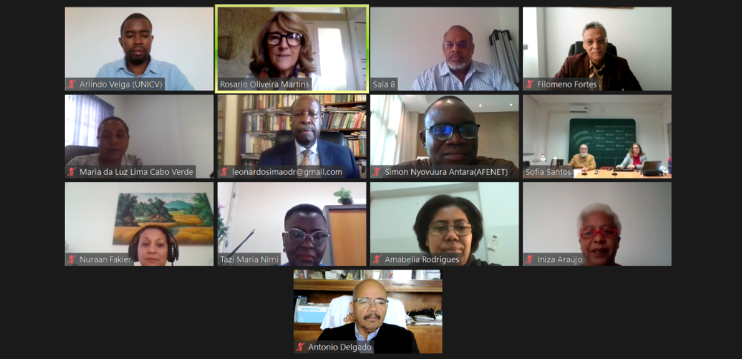
The inaugural meeting of the first edition of the “Master in Field Epidemiology Training for Portuguese-speaking West African Countries” (2022-2024) took place in virtual format from 9 to 13 December 2021. The virtual meeting was attended by the EDCTP High Representative Africa, Dr Leonardo Simão and EDCTP Project Officer Nuraan Fakier. The Master’s programme will start in April 2022 and will last for 24 months. The first edition is intended to train 15 staff from the National Health Services (NHS) from three countries: Cape Verde, Guinea-Bissau and São Tomé and Príncipe. The training is funded by EDCTP and the Africa Centres for Disease Control and Prevention (Africa CDC) as part of a scheme aiming to support a total of 150 “EPI-Biostat Fellows” through ten grants awarded to institutions in sub-Saharan Africa and Europe.
A consortium consisting of five National Institutes of Public Health (African INSP), five academic institutions (three African and two European) and five research centres (three African and two European) submitted a proposal based on the Field Epidemiology Training Programmes experiences of Mozambique and Angola, to train field epidemiologists from Cape Verde, Guinea-Bissau and São Tomé and Príncipe.
The project is led by Prof. Mohsin Sidat, from the Institute of Hygiene and Tropical Medicine, Universidade Nova de Lisboa (IHMT-NOVA) and the Eduardo Mondlane University, co-advised by Dr António Pedro Delgado from Universidade de Cabo Verde (UniCV) and Prof. Paulo Ferrinho from UniCV and IHMT-NOVA.
The Master’s Degree in Field Epidemiology aims to train quality human resources and strengthen national and institutional capacity to carry out relevant scientific research in health areas capable of strengthening epidemiological surveillance and response to outbreaks and epidemics. Thus, it is expected that FETP-CV will train professionals with skills in field epidemiology capable of strengthening disease prevention and control services, including the epidemiological surveillance system and response to outbreaks and epidemics in the country, region and/or globally.
The first edition is intended to train 15 staff from the National Health Services (NHS) from three countries: Cape Verde, Guinea-Bissau and São Tomé and Príncipe. Trainees will be placed in health system locations in their home country where they will learn by doing and applying their theoretical knowledge in the appropriately selected internship locations. Practical training in the countries of origin, complemented with theoretical training offered online, will allow better insertion and retention of staff in their countries of origin and eventually also in the country’s NHS.
Candidates, selected by the NHS services, particularly by the National Institutes of Public Health, must be citizens from Cape Verde, Guinea-Bissau or São Tomé and Príncipe. They must have degrees in the areas of health, biological, human and social sciences, exact, natural, legal, political, economic and other sciences with interest and experience in the area of public health, epidemiology and biostatistics. The deadline for application is 15 February 2022.
